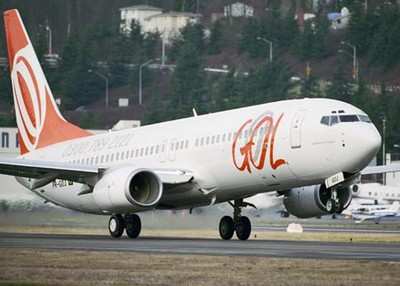Schedules First International Commercial Flights With Newly Approved Amyris-Total Aviation Biofuel
Amyris has partnered with Brazilian airline GOL to begin the first commercial route with farnesane, the recently approved renewable jet fuel.

GOL has committed to fly its Boeing 737 fleet with up to a 10 percent blend of the renewable fuel on its U.S. to Brazil routes starting with initial flights later this month. Supported by Boeing, the Inter-American Development Bank (IDB) and other partners, Amyris is working to bring this new, renewable jet fuel to commercial airlines starting with Brazil's GOL Airlines.
"We at Amyris are thrilled that GOL will be using our renewable jet fuel blend for their flight route from the United States to Brazil, the first of what we expect to be many routes with the world's leading airlines. With our partner Total, Amyris is working to support the performance goals set by the aviation industry by bringing to market a drop-in, low-carbon jet fuel solution," said John Melo, President & CEO at Amyris.
Developed by Amyris, an industrial bioscience company, and Total, one of the world's leading energy companies, this new aviation renewable fuel meets the rigorous performance requirements set for Jet A/A-1 fuel used by the global commercial aviation industry. On June 15, ASTM revised the ASTM for jet fuel standard, paving the way for airlines to use Synthesized Iso-Paraffin (SIP) farnesane as a jet fuel component in commercial airlines globally. When produced sustainably, farnesane can reduce greenhouse-gas emissions by up to 80% on a lifecycle basis compared to traditional petroleum fuels.
"This low carbon and sustainable biofuel is part of a major commitment of GOL to address the IATA Carbon Neutral Growth 2020 Program. We are working closely with the Brazilian Biojet Fuel Platform to achieve the 1% blend milestone in early 2016, beginning with more than 200 sustainable flights during the World Cup in Brazil," said Pedro Scorza, Director of Technical Operations from GOL. "Using the Amyris-Total renewable jet fuel in our flight route from the United States to Brazil is another way to bring public awareness to the importance of sustainable fuel solutions to the global environment."
The global aviation industry has committed to aggressive goals to reduce its GHG emissions, including achieving carbon neutral growth by 2020 and reducing emissions by 50 percent by 2050 compared to 2005. In addition to improving the efficiency of airplanes and flight operations, sustainable aviation biofuel represents a major opportunity for commercial aviation to reduce emissions. Approved renewable jet fuels are drop-in and can be blended directly with petroleum jet fuel without any changes to airplanes, engines or fueling infrastructure.

"As part of Boeing's long-term commitment to advance sustainable aviation biofuel, we are pleased to work alongside our customer GOL, as well as Amyris and Total, to support the first commercial flights using a farnesane blend," said Julie Felgar, Boeing Commercial Airplanes managing director of Environmental Strategy and Integration.
In addition to reducing greenhouse gas emissions, industry studies have shown that farnesane reduces particulate matter emissions by 3%, reducing pollution near airports and major metropolitan areas. This renewable jet fuel, which is made in Brazil from sugarcane, can be up to 30% more efficient in land use compared to other renewable fuels (by liters/hectare) and it could become approximately 70% more efficient than such fuels when new technologies, like sugar from cellulosic feedstocks, become commercially available.
The revised standard, D7566, developed by ASTM Committee on Petroleum Products, Liquid Fuels, and Lubricants, now includes the use of renewable farnesane as a blending component in jet fuels for commercial aviation. This latest version of ASTM D7566, Standard Specification for Aviation Turbine Fuel Containing Synthesized Hydrocarbons, will allow a biomass-based renewable jet fuel, as developed by Amyris and Total, to support the commercial airliners' goal of reducing greenhouse gas emissions.
(GOL 737 pictured in file photo)
 ANN's Daily Aero-Term (04.14.24): Maximum Authorized Altitude
ANN's Daily Aero-Term (04.14.24): Maximum Authorized Altitude ANN's Daily Aero-Linx (04.14.24)
ANN's Daily Aero-Linx (04.14.24) Classic Aero-TV: 'We're Surviving'-- Kyle Franklin Describes Airshow Life 2013
Classic Aero-TV: 'We're Surviving'-- Kyle Franklin Describes Airshow Life 2013 Aero-News: Quote of the Day (04.14.24)
Aero-News: Quote of the Day (04.14.24) Airborne 04.09.24: SnF24!, Piper-DeltaHawk!, Fisher Update, Junkers
Airborne 04.09.24: SnF24!, Piper-DeltaHawk!, Fisher Update, Junkers




